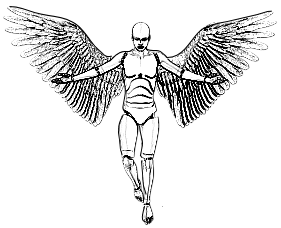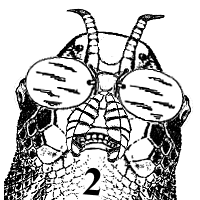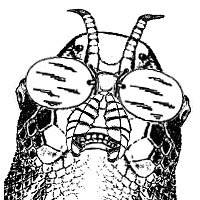 Susan Schneider’s recent paper argues that when we hear from alien civilisations, it’s almost bound to be super intelligent robots getting in touch, rather than little green men. She builds on Nick Bostrom’s much-discussed argument that we’re all living in a simulation.
Susan Schneider’s recent paper argues that when we hear from alien civilisations, it’s almost bound to be super intelligent robots getting in touch, rather than little green men. She builds on Nick Bostrom’s much-discussed argument that we’re all living in a simulation.
Actually, Bostrom’s argument is more cautious than that, and more carefully framed. His claim is that at least one of the following propositions is true:
(1) the human species is very likely to go extinct before reaching a “posthuman” stage;
(2) any posthuman civilization is extremely unlikely to run a significant number of simulations of their evolutionary history (or variations thereof);
(3) we are almost certainly living in a computer simulation.
So that if we disbelieve the first two, we must accept the third.
In fact there are plenty of reasons to argue that the first two propositions are true. The first evokes ideas of nuclear catastrophe or an unexpected comet wiping us out in our prime, but equally it could just be that no post human stage is ever reached. We only know about the cultures of our own planet, but two of the longest lived – the Egyptian and the Chinese – were very stable, showing few signs of moving on towards post humanism. They made the odd technological advance, but they also let things slip: no more pyramids after the Old Kingdom; ocean-going junks abandoned before being fully exploited. Really only our current Western culture, stemming from the European Renaissance, has displayed a long run of consistent innovation; it may well be a weird anomaly and its five-hundred year momentum may well be temporary. Maybe our descendants will never go much further than we already have; maybe, thinking of Schneider’s case, the stars are basically inhabited by Ancient Egyptians who have been living comfortably for millions of years without ever discovering electricity.
The second proposition requires some very debatable assumptions, notably that consciousness is computable. But the notion of “simulation” also needs examination. Bostrom takes it that a computer simulation of consciousness is likely to be conscious, but I don’t think we’d assume a digital simulation of digestion would do actual digesting. The thing about a simulation is that by definition it leaves out certain aspects of the real phenomenon (otherwise it’s the phenomenon itself, not a simulation). Computer simulations normally leave out material reality, which could be a problem if we want real consciousness. Maybe it doesn’t matter for consciousness; Schneider argues strongly against any kind of biological requirement and it may well be that functional relations will do in the case of consciousness. There’s another issue, though; consciousness may be uniquely immune from simulation because of its strange epistemological greediness. What do I mean? Well, for a simulation of digestion we can write a list of all the entities to be dealt with – the foods we expect to enter the gut and their main components. It’s not an unmanageable task, and if we like we can leave out some items or some classes of item without thereby invalidating the simulation. Can we write a list of the possible contents of consciousness? No. I can think about any damn thing I like, including fictional and logically impossible entities. Can we work with a reduced set of mental contents? No; this ability to think about anything is of the essence.
All this gets much worse when Bostrom floats the idea that future ancestor simulations might themselves go on to be post human and run their own nested simulations, and so on. We must remember that he is really talking about simulated worlds, because his simulated ancestors need to have all the right inputs fed to them consistently. A simulated world has to be significantly smaller in information terms than the world that contains it; there isn’t going to be room within it to simulate the same world again at the same level of detail. Something has to give.
Without the indefinite nesting, though, there’s no good reason to suppose the simulated ancestors will ever outnumber the real people who ever lived in the real world. I suppose Bostrom thinks of his simulated people as taking up negligible space and running at speeds far beyond real life; but when you’re simulating everything, that starts to be questionable. The human brain may be the smallest and most economic way of doing what the human brain does.
Schneider argues that, given the same Whiggish optimism about human progress we mentioned earlier, we must assume that in due course fleshy humans will be superseded by faster and more capable silicon beings, either because robots have taken over the reins or because humans have gradually cyborgised themselves to the point where they are essentially super intelligent robots. Since these post human beings will live on for billions of years, it’s almost certain that when we make contact with aliens, that will be the kind we meet.
She is, curiously, uncertain about whether these beings will be conscious. She really means that they might be zombies, without phenomenal consciousness. I don’t really see how super intelligent beings like that could be without what Ned Block called access consciousness, the kind that allows us to solve problems, make plans, and generally think about stuff; I think Schneider would agree, although she tends to speak as though phenomenal, experiential consciousness was the only kind.
She concludes, reasonably enough, that the alien robots most likely will have full conscious experience. Moreover, because reverse engineering biological brains is probably the quick way to consciousness, she thinks that a particular kind of super intelligent AI is likely to predominate: biologically inspired superintelligent alien (BISA). She argues that although BISAs might in the end be incomprehensible, we can draw some tentative conclusions about BISA minds:
(i). Learning about the computational structure of the brain of the species that created the BISA can provide insight into the BISAs thinking patterns.
(ii) BISAs may have viewpoint invariant representations. (Surely they wouldn’t be very bright if they didn’t?)
(iii) BISAs will have language-like mental representations that are recursive and combinatorial. (Ditto.)
(iv) BISAs may have one or more global workspaces. (If you believe in global workspace theory, certainly. Why more than one, though – doesn’t that defeat the object? Global workspaces are useful because they’re global.)
(v) A BISA’s mental processing can be understood via functional decomposition.
I’ll throw in a strange one; I doubt whether BISAs would have identity, at least not the way we do. They would be computational processes in silicon: they could split, duplicate, and merge without difficulty. They could be copied exactly, so that the question of whether BISA x was the same as BISA y could become meaningless. For them, in fact, communicating and merging would differ only in degree. Something to bear in mind for that first contact, perhaps.
This is interesting stuff, but to me it’s slightly surprising to see it going on in philosophy departments; does this represent an unexpected revival of the belief that armchair reasoning can tell us important truths about the world?
 I hope you don’t mind me asking – I just happened to be passing - but how did you get so very badly damaged?
I hope you don’t mind me asking – I just happened to be passing - but how did you get so very badly damaged? 
 Scott Bakker’s alien consciousnesses are
Scott Bakker’s alien consciousnesses are  We are in danger of being eliminated by aliens who aren’t even conscious,
We are in danger of being eliminated by aliens who aren’t even conscious, 
